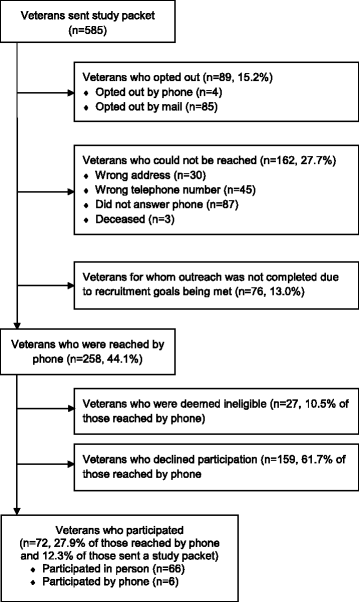Practical application of opt-out recruitment methods in two health services research studies
- PMID: 28410585
- PMCID: PMC5391553
- DOI: 10.1186/s12874-017-0333-5
Practical application of opt-out recruitment methods in two health services research studies
Abstract
Background: Participant recruitment is an ongoing challenge in health research. Recruitment may be especially difficult for studies of access to health care because, even among those who are in care, people using services least often also may be hardest to contact and recruit. Opt-out recruitment methods (in which potential participants are given the opportunity to decline further contact about the study (opt out) following an initial mailing, and are then contacted directly if they have not opted out within a specified period) can be used for such studies. However, there is a dearth of literature on the effort needed for effective opt-out recruitment.
Methods: In this paper we describe opt-out recruitment procedures for two studies on access to health care within the U.S. Department of Veterans Affairs. We report resource requirements for recruitment efforts (number of opt-out packets mailed and number of phone calls made). We also compare the characteristics of study participants to potential participants via t-tests, Fisher's exact tests, and chi-squared tests.
Results: Recruitment rates for our two studies were 12 and 21%, respectively. Across multiple study sites, we had to send between 4.3 and 9.2 opt-out packets to recruit one participant. The number of phone calls required to arrive at a final status for each potentially eligible Veteran (i.e. study participation or the termination of recruitment efforts) were 2.9 and 6.1 in the two studies, respectively. Study participants differed as expected from the population of potentially eligible Veterans based on planned oversampling of certain subpopulations. The final samples of participants did not differ statistically from those who were mailed opt-out packets, with one exception: in one of our two studies, participants had higher rates of mental health service use in the past year than did those mailed opt-out packets (64 vs. 47%).
Conclusions: Our results emphasize the practicality of using opt-out methods for studies of access to health care. Despite the benefits of these methods, opt-out alone may be insufficient to eliminate non-response bias on key variables. Researchers will need to balance considerations of sample representativeness and feasibility when designing studies investigating access to care.
Keywords: Access; Health services; Opt-out; Recruitment.
Figures
Similar articles
-
Recruitment tools for transgender and gender diverse veterans in health care research.Psychol Serv. 2024 Nov;21(4):908-915. doi: 10.1037/ser0000841. Epub 2024 Mar 4. Psychol Serv. 2024. PMID: 38436647
-
Preferences for opt-in and opt-out enrollment and consent models in biobank research: a national survey of Veterans Administration patients.Genet Med. 2012 Sep;14(9):787-94. doi: 10.1038/gim.2012.45. Epub 2012 Apr 26. Genet Med. 2012. PMID: 22538255
-
Participant recruitment in sensitive surveys: a comparative trial of 'opt in' versus 'opt out' approaches.BMC Med Res Methodol. 2013 Jan 11;13:3. doi: 10.1186/1471-2288-13-3. BMC Med Res Methodol. 2013. PMID: 23311340 Free PMC article. Clinical Trial.
-
Service design for children and young people with common mental health problems: literature review, service mapping and collective case study.Health Soc Care Deliv Res. 2024 May;12(13):1-181. doi: 10.3310/DKRT6293. Health Soc Care Deliv Res. 2024. PMID: 38767587 Review.
-
Opt-In and Opt-Out Consent Procedures for the Reuse of Routinely Recorded Health Data in Scientific Research and Their Consequences for Consent Rate and Consent Bias: Systematic Review.J Med Internet Res. 2023 Feb 28;25:e42131. doi: 10.2196/42131. J Med Internet Res. 2023. PMID: 36853745 Free PMC article.
Cited by
-
Enhancing study recruitment through implementation of an opt-out, cold contact process with consideration for autonomy, beneficence and justice.J Clin Transl Sci. 2023 Feb 8;7(1):e63. doi: 10.1017/cts.2023.21. eCollection 2023. J Clin Transl Sci. 2023. PMID: 37008607 Free PMC article.
-
Enhancing sleep quality for nursing home residents with dementia: a pragmatic randomized controlled trial of an evidence-based frontline huddling program.BMC Geriatr. 2021 Apr 27;21(1):281. doi: 10.1186/s12877-021-02189-8. BMC Geriatr. 2021. PMID: 33906631 Free PMC article.
-
Secondary analysis of electronic opt-out consent in pragmatic research: A study design method to diversify clinical trials?Am Heart J. 2023 Jul;261:104-108. doi: 10.1016/j.ahj.2023.03.010. Epub 2023 Mar 25. Am Heart J. 2023. PMID: 36966921 Free PMC article.
-
Development of the Perceived Access Inventory: A patient-centered measure of access to mental health care.Psychol Serv. 2020 Feb;17(1):13-24. doi: 10.1037/ser0000235. Epub 2018 Jul 19. Psychol Serv. 2020. PMID: 30024190 Free PMC article.
-
Impact of Attitudes and Rurality on Veterans' Use of Veterans Health Administration Mental Health Services.Psychiatr Serv. 2021 May 1;72(5):521-529. doi: 10.1176/appi.ps.201900275. Epub 2021 Mar 11. Psychiatr Serv. 2021. PMID: 33691490 Free PMC article.
References
-
- Johnson LC, Beaton R, Murphy S, Pike K. Sampling bias and other methodological threats to the validity of health survey research. Int J Stress Mgmt. 2000;7(4):247–267. doi: 10.1023/A:1009589812697. - DOI
-
- Treweek S, Pitkethly M, Cook J, Kjeldstrom M, Taskila T, Johansen M, Mitchell E. Strategies to improve recruitment to randomised controlled trials. Cochrane Database Syst Rev. 2011;10-.[MR000013]. doi:10.1002/14651858.MR000013.pub5. - PubMed
-
- Atkinson R, Flint J. Accessing hidden and hard-to-reach populations: snowball research strategies. Soc Res Update. 2001;33(1):1–4.
MeSH terms
Grants and funding
LinkOut - more resources
Full Text Sources
Other Literature Sources
Miscellaneous



